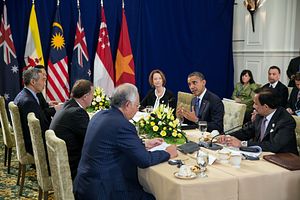The changing situation brought about by the Permanent Court of Arbitration increases the political value of the Trans Pacific Partnership, and raises the urgency with which the United States must address it.
The repudiation by the PCA of China’s claims in the South China Sea makes increased tension in that region more, rather than less, likely. That, at least, seems to be the prevailing view in the international press, and is reinforced by the generally vituperative response of Chinese officials. Although there are feint glimmers of reticence in some Chinese reactions, such as the avoidance of any mention of the “nine-dash line” in a lengthy white-paper issued by China’s State Council, most comments from Beijing have denounced the legitimacy of the Court and emphasized Philippine hostility implicit in bringing the case, reiterated China’s sweeping claims of sovereignty, and lambasted the United States for favorably characterizing the decision and recommending that China abide by it.
Now, the world awaits concrete reaction from China. Will it declare an “air defense identification zone” in the South China Sea? Will it construct more artificial islands? Will it further militarize various rocks and reefs? Will it intensify harassment of Philippine and Vietnamese fishing vessels? Will it more aggressively challenge U.S. freedom of navigation operations and surveillance flights? None of these actions will be surprising; any of them will heighten tensions that are already dangerous.
In that the Philippines, Vietnam, and other claimants in the region cannot effectively deter or repel Chinese military moves, U.S. intentions in the region are a correspondingly important question.
It would be absurd, of course, to suggest that adoption of the TPP is any kind of response to China’s increasing military reach in the South China Sea. In the political realm, however, U.S. rejection of the TPP, now a very live possibility, would so demoralize Asian TPP partners, and so undermine U.S. claims to have deep interests in the region, as to severely complicate the task of assembling and encouraging the coalitions of nations necessary to stand up to China. That is, rejection of the TPP by the U.S. may reasonably be interpreted as “throwing in the towel,” giving up on the long-range project of resisting the establishment of outright Chinese dominance of Southeast Asia, and perhaps all of East Asia.
How can it be that the TPP is so endangered in the United States, where free trade has been a paramount principle of foreign policy for generations? The answer lies in the unusually chaotic political winds that buffet the American electorate this year.
Economic populism, generally highlighting issues of inequality, has risen to a level of prominence, and of shrillness, not seen in American politics since the 1930s heyday of Huey Long and Charles Coughlin. As those demagogues did then, many of today’s leading politicians, especially those running for president, dwell on the growing disparity between rich and poor, rail against Wall Street, demonize banking and finance, and demand protection against economically rapacious foreign competitors. Simplistic, even fantastic, proposals abound: a wall on the Mexican border, or a near doubling of the “minimum wage.” The leading voices of this new populism are Donald Trump, Bernie Sanders, and Elizabeth Warren, all of whom have striven not to be outdone in excoriating the TPP. Hillary Clinton, who was among the architects of the TPP and once described it as the “gold standard” of trade pacts, was force-checked into opposition by Bernie Sanders and the populist chorus on the left of the Democratic Party. Similar to the manner in which Theresa May must now lead Britain’s exit from the EU, to which she was opposed, a President Hillary Clinton will be expected to preside over the demise of the TPP she once vigorously supported.
The opponents of the TPP focus on the decline of manufacturing in the U.S. and the consequent loss of good jobs. Receptivity to their message is nurtured by the dwindling fortunes of America’s white working and middle classes. These economic misfortunes are real, and, as was the case eight decades ago, such troubles provide fertile ground for populist mischief. Contrary to studies by the World Bank and other non-partisan analysts, showing that the TPP should contribute to the long-term growth of the U.S. economy, Americans seem to be convinced that it will exacerbate decline, and that protectionist policies will bring back American jobs.
President Barack Obama has spoken forcefully in support of the agreement, but, with a short duration to his remaining term of office, his ability to influence Americans’ thinking is at a low ebb. His support for the TPP has usually been expressed in terms of the economic benefits of trade. What is needed now in the United States, however, is persuasive advocacy of the pact’s geopolitical importance. But public opinion in the U.S. holds Obama to have been relatively unsuccessful in foreign affairs, and, regrettably, in this area his ability to persuade is especially diminished.
The collapse of the TPP will disappoint and disillusion many of the countries who looked forward to its implementation and worked hard to bring it about. Public support for the TPP in most of those countries runs high, even close to 90 percent, for example, in Vietnam. To be the cause of the agreement’s failure will deal a severe loss of prestige for the United States in Asia. It will be measurably more difficult for Vietnam, the Philippines, and other nations in the region to resist the temptation to throw in their lot with China, however unenthusiastic they may be about it. It may be too much to expect the U.S. electorate to shake off its populist delusions and rescue the TPP, but something like that is the urgent order of the day.
William G. Frasure is Professor of Government at Connecticut College.

































